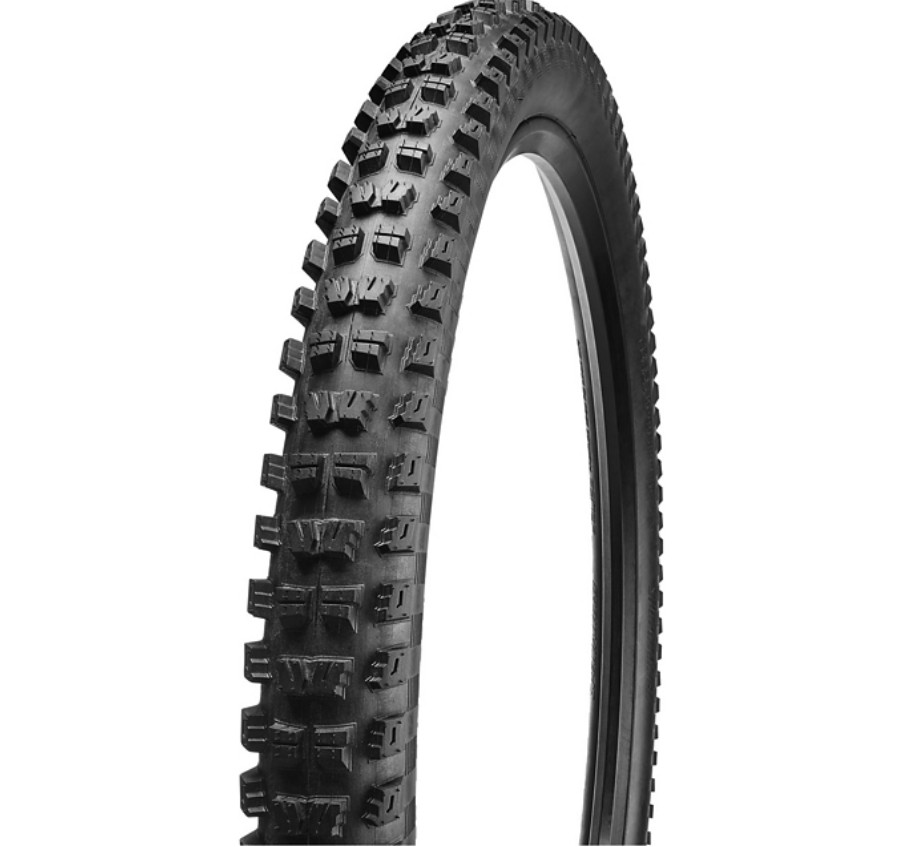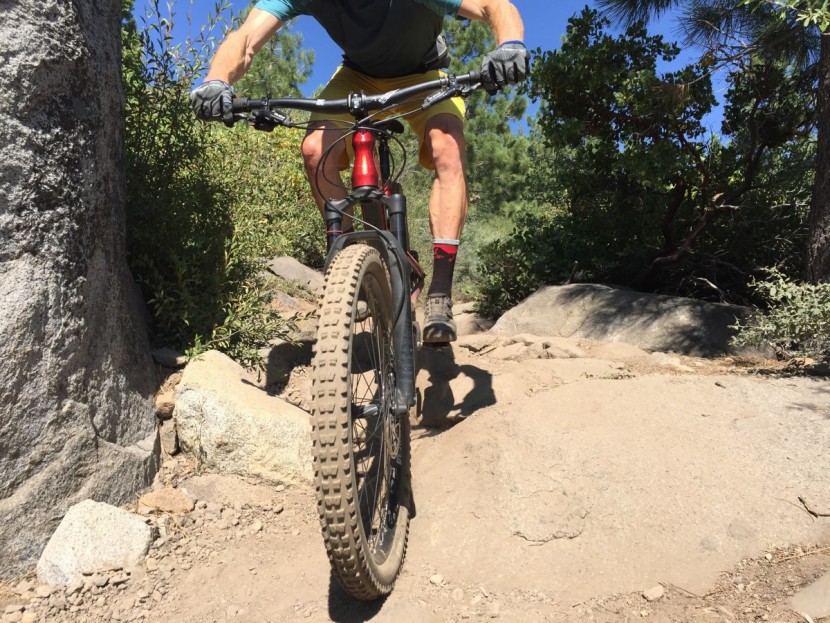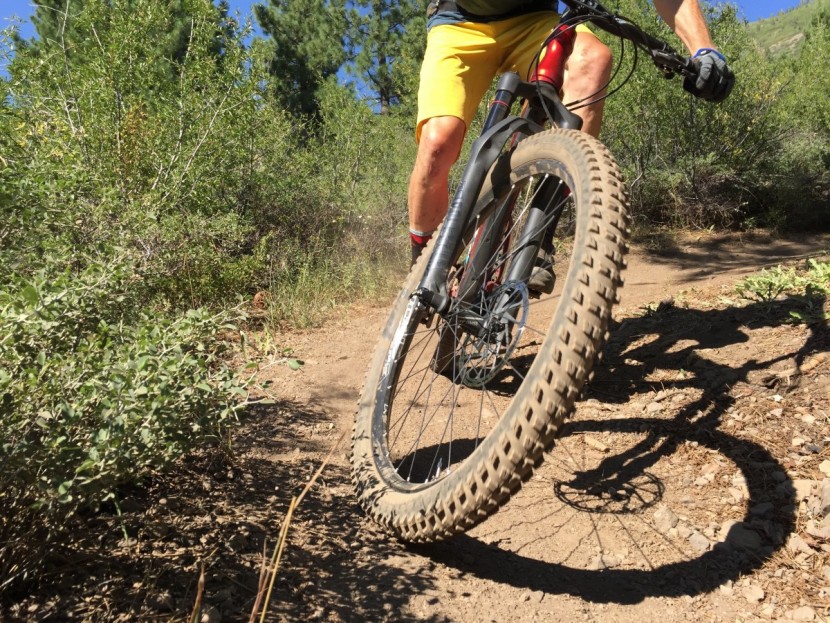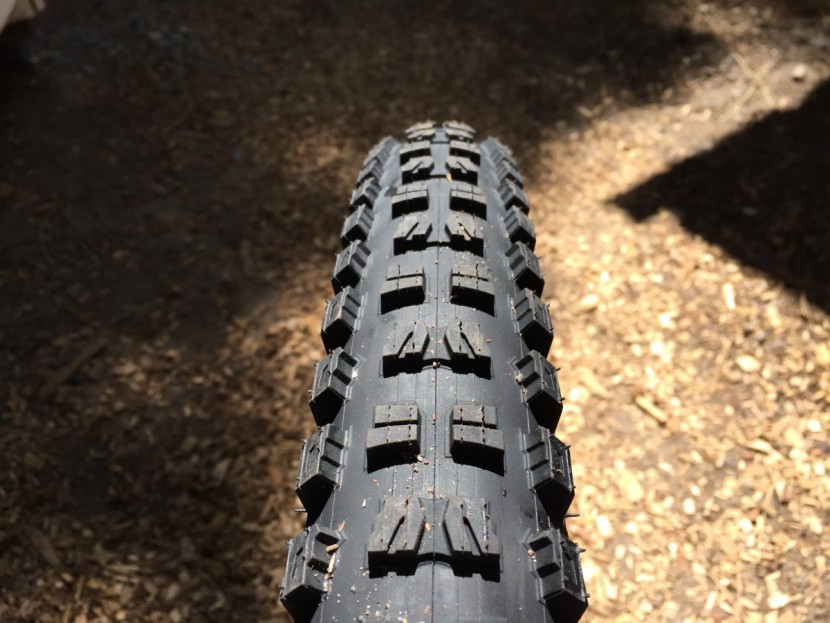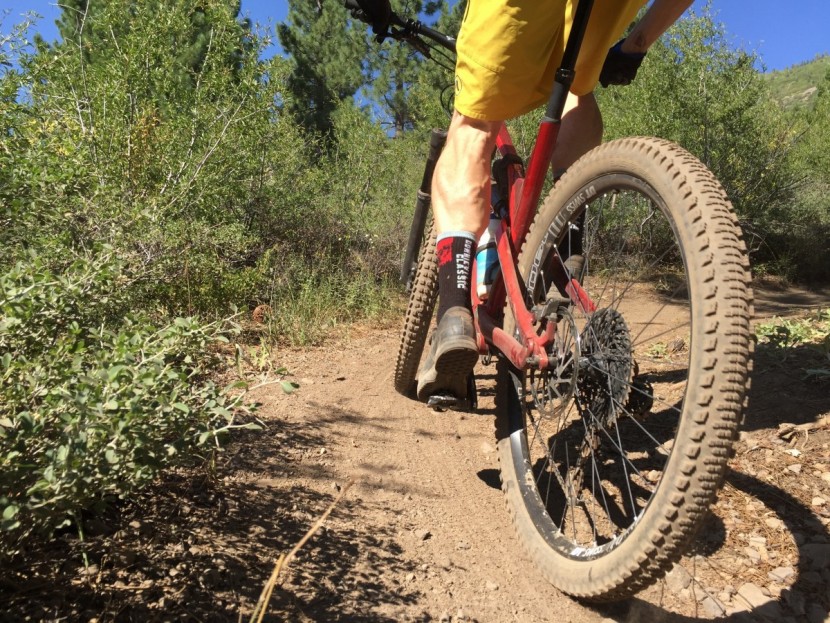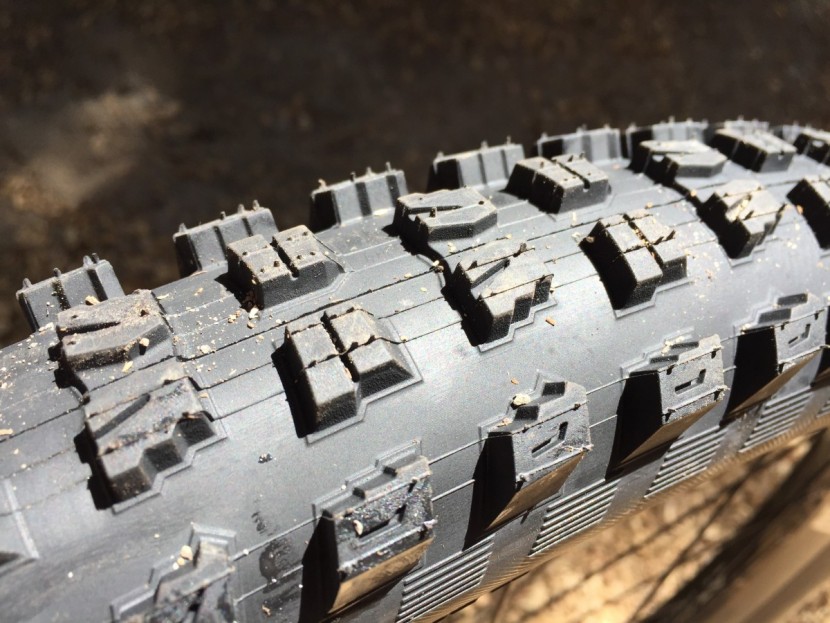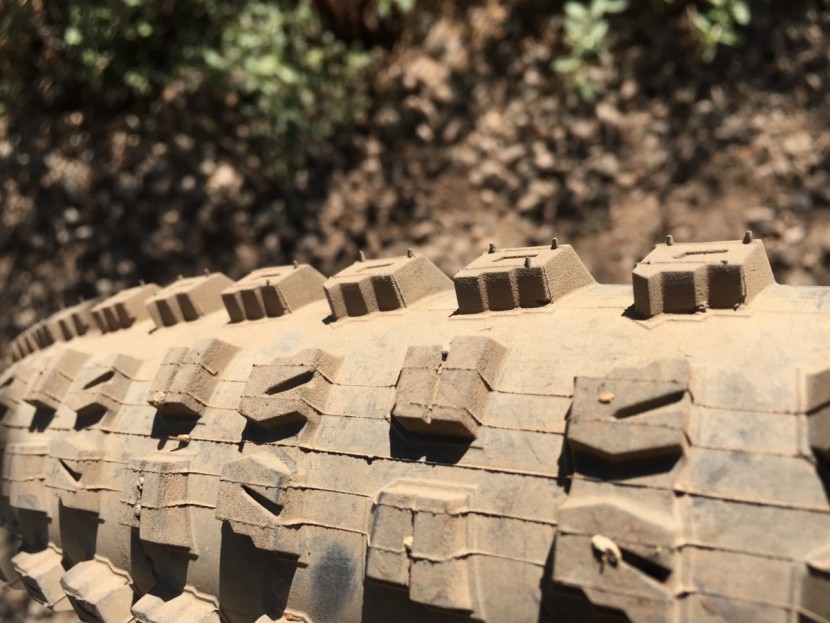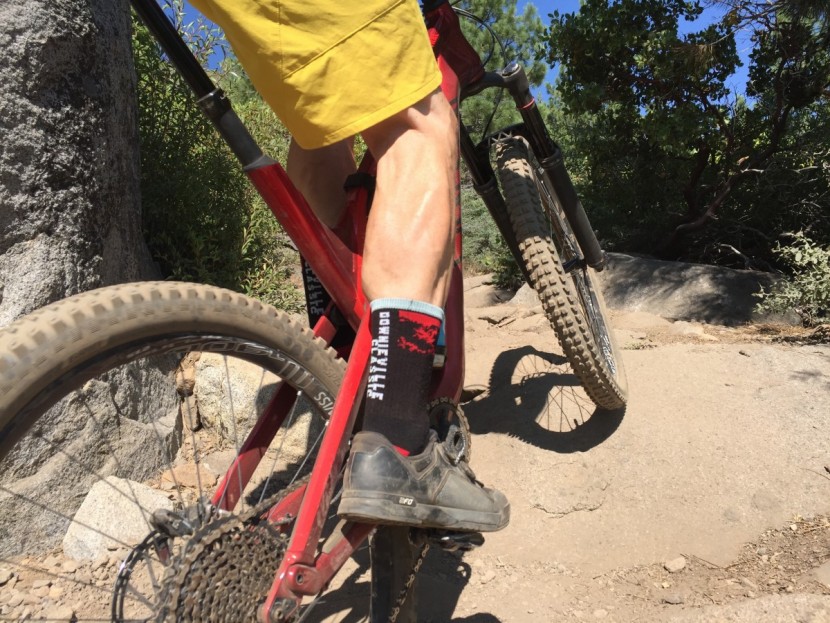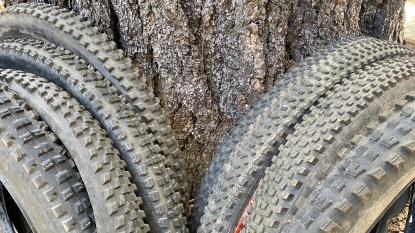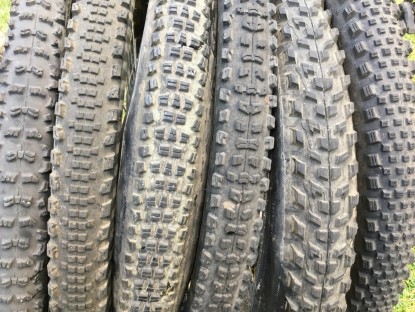Specialized Butcher Grid Review
Our Verdict
Our Analysis and Test Results
We revisited the Butcher Grid during our most recent round of testing to see how it stacked up against a new group of competitors. While it still has the same tread pattern, it has seen some minor changes over the previous version we tested, most notably slightly taller knobs all around, sawtooth edges added to the sides of the knobs, and Specialized Gripton rubber compound. We rode the Butcher Grid as a front tire in combination with the Slaughter Grid in the rear on a variety of trails and conditions, from deep and loose mid-summer dryness to post-rain hero dirt.
Cornering
One of the primary places the Butcher Grid excels is in the corners. This tire's tall knobs are stout and relatively widely spaced, and it looks strikingly similar to our Editor's Choice Award winner, the Maxxis Minion DHF at a glance. That said, it has a slightly more rounded profile overall, with shorter side knobs than the DHF that give this tire a predictable roll as you lean the bike over to corner. Both the center and side knobs have squared off edges that provide lots of bite, and despite having a generous gap between them, this tire has virtually no dead-spot feel as you transition from the middle to the sides.
The 2.6" width tested also adds to this tire's traction in corners. The higher air volume allows for slightly lower pressures, and the additional girth makes for a larger contact patch between the tires and the ground. We tested the Butcher Grid at pressures ranging from 18-25 psi, and we found that its traction improved as pressure decreased, but only to a point. While it does have Specialized's beefier Grid casing, the sidewall support is excellent but not nearly as substantial as that found on much heavier tires like the Maxxis Assegai and WTB Convict. The sidewalls have noticeable roll once your tire pressure gets below 20psi. That said, they have excellent traction between 20-25psi, and we found our sweet spot to be right around 22psi.
One of the primary reasons for their excellent cornering ability is the nicely spaced row of side knobs. These stout side knobs offer excellent support and bite when the tire is tipped over on edge. They aren't quite as tall as those found on the Maxxis Minion DHF, Maxis Assegai, WTB Convict, or Schwalbe Magic Mary, so they did tend to break traction a little sooner than those models, but it isn't far off and is pretty easy to get used to.
Pedal Traction
Specialized is using their “Gripton” rubber compound on all of their most popular trail tires, and the Butcher Grid is no exception. The rubber is on the softer end of the spectrum, and we found it to grip well on a variety of surfaces, from smooth rock to tricky loose over hardpack conditions. The tall knobs enhance the grip of the rubber with squared-off edges that want to dig in and grab hold of pretty much everything they encounter. Additionally, every knob on the tire has siping which grabs onto the rolling surface even further.
We prefer to use the Butcher Grid as a front tire, but it can certainly be used as a rear tire as well. It is an aggressive tread for the rear, but the tall center knobs with squared-off edges provide a high level of traction when climbing and grab onto everything when scrambling uphill. We experienced little in the way of wet conditions while testing the Butcher Grid, but we went out of our way to find a little mud. The widely-spaced knobs work well in muddy conditions and shed mud as quickly as they pick it up.
Braking Traction
The Butcher Grid provides a high level of braking traction. The tall knobs with squared-off edges are eager to bite into the ground, and performed well even when braking in loose or sandy conditions as a result. The addition of sipes on all of the knobs further enhances the braking traction, especially on firm surfaces like hard-packed dirt or rock. All of the knobs are stout and feel well supported, and hold strong under braking forces as opposed to folding or squirming, even the side knobs as long as you are running a high enough tire pressure.
Rolling Resistance
Considering this tire's roots in downhill riding, we kept our expectations low regarding its willingness to roll efficiently. We were impressed with how the tall and widely spaced center knobs seemed to do a good job of keeping things rolling. The center knobs have an alternating pattern of two connected knobs with vertical edges front and back and two separate knobs with a slightly ramped front edge. Of course, there are fasting rolling tires out there, like the semi-slick models we tested, but considering the aggressive tread and wide spacing of the knobs, this tire rolls much better than expected. We suggest running the Butcher Grid as a front tire for its great cornering and traction, paired with a rear tire like the Slaughter Grid with tightly packed low-profile center knobs that roll even faster.
Longevity
The Butcher Grid surprised our testers with its durability. While running too low of pressure, we rimmed out on this tire four times in the same ride, and every time we expected to have a pinch flat as a result. To our surprise, none of those hits caused our tire to flat or even cause a slow leak. Some of our testers have had mixed results with Specialized's Grid casing in the past, but it held strong for us throughout our testing. According to Specialized, the Grid casing offers 23 percent improved cut resistance over their lighter weight and thinner Control casing. We won't argue with that considering the abuse and abrasion the sidewalls have taken with no tears or even sealant seepage to speak of.
The side knobs are the first place that most tire's tread will show significant wear due to the forces applied to them during cornering. After 100 miles of use on rough and rugged trails in the Tahoe area, the side knobs of the Butcher Grid are still in very good condition. The rubber shows just a little of the erosion that is the first sign of wear, and all the knobs are still very well connected.
Installation
Unlike the previous version of the Butcher Grid that we tested, installing this tire was among the easiest in our test. This tire is easy to get onto the rim and did not require the use of a tire lever. Often when it's easy to get a tire onto a rim, it will be difficult to seat the bead, but this was not the case with the Butcher Grid. We were able to seat the bead of this tire with the use of a floor pump, easily we might add, no compressor or frustration of any kind was needed.
Value
In a market flooded with mountain bike tires that can cost as much as passenger car tires, its refreshing to see quality products offered at reasonable prices. At its retail price, the Butcher Grid still isn't exactly cheap but costs $20-30 less than much of the competition. Considering the all-around performance, versatility, and durability of this tire are on par or better than many of the higher-priced competitors, we feel this is a great value.
Conclusion
If you're looking for a great price to performance ratio in a mountain bike tire, you can find it in the Butcher Grid. This versatile all-mountain tire does everything relatively well. It may not be the best at any one thing, but it makes up for that with a very well rounded performance that impressed our testers out on the trail. This tire's combination of cornering, traction, rolling resistance, durability, and ease of installation made it a tester favorite. Combine its performance with the reasonable asking price, and we'd recommend this tire to anyone for all-mountain and trail riding.
Other Versions
The Butcher Grid is available for 26" wheels in a 2.3" width only. For 27.5" wheels it is available in 2.3", 2.6" (tested), and 2.8" widths. For 29" wheels it comes in 2.3" and 2.6" versions.
The Butcher Control ($55) features the same tread pattern with a lighter weight and thinner casing than the Grid version we tested. The Control version is offered in 26", 27.5", and 29" sizes in a 2.3" width only.
The Butcher DH ($75) is the downhill racing version, with a wire bead, beefier sidewalls, and a much heavier weight. It is offered for 26" and 27.5" wheels in both 2.3" and 2.5" widths.


